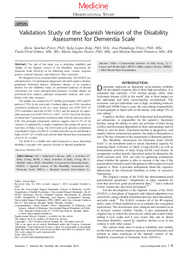Por favor, use este identificador para citar o enlazar este ítem:
https://hdl.handle.net/11000/35840Registro completo de metadatos
| Campo DC | Valor | Lengua/Idioma |
|---|---|---|
| dc.contributor.author | Sánchez-Pérez, Alicia | - |
| dc.contributor.author | López Roig, Sofía | - |
| dc.contributor.author | Pampliega, Ana | - |
| dc.contributor.author | Peral-Gómez, Paula | - |
| dc.contributor.author | Ángeles Pastor, María | - |
| dc.contributor.author | HURTADO-POMARES, MIRIAM | - |
| dc.contributor.other | Departamentos de la UMH::Patología y Cirugía | es_ES |
| dc.contributor.other | Departamentos de la UMH::Psicología de la Salud | es_ES |
| dc.date.accessioned | 2025-03-07T08:50:30Z | - |
| dc.date.available | 2025-03-07T08:50:30Z | - |
| dc.date.created | 2015-10 | - |
| dc.identifier.citation | Medicine, 94(44), e1925 - November 2015 | es_ES |
| dc.identifier.issn | 1536-5964 | - |
| dc.identifier.uri | https://hdl.handle.net/11000/35840 | - |
| dc.description.abstract | Abstract: The aim of this study was to determine reliability and validity of the Spanish version of the Disability Assessment for Dementia Scale (DAD-E) in the following areas: content, response process, internal structure, and relation to other constructs. We designed a cross-sectional observational study. The DAD-E was administered to 132 participants diagnosed with mild cognitive decline, prodromal Alzheimer disease, Alzheimer disease, or no cognitive decline. For the reliability study, we performed analyses of internal consistency, test–retest, and equivalent measures. To study validity, we performed item analysis, principal components analysis, and correlations with other measures. The sample was composed of 37 healthy participants (28%) and 95 patients (72%). In the total scale, Cronbach alpha was 0.963, intraclass correlation coefficient in the test–retest analysis was 0.983 (95% CI [95% confidence interval]¼0.969–0.991), and the analysis for equivalent measures was 0.949 (95% CI¼0.897–0.975). Out of the 40 items, we found that 37 presented a correlation index with the total score above 0.40. The principal components analysis suggests that 61.7% of the variance is explained by a single component that groups all scores on Activities of Daily Living. The DAD total score presents correlations with Barthel’s Index of 0.882 (P¼0.000) and with Lawton and Brodie’s Index of 0.877 (P¼0.000) and with the Mini Mental State Examination of 0.679 (P¼0.000). The DAD-E is a reliable and valid instrument to assess functional disability in people with cognitive decline in Spanish population. | es_ES |
| dc.format | application/pdf | es_ES |
| dc.format.extent | 5 | es_ES |
| dc.language.iso | eng | es_ES |
| dc.publisher | Wolters Kluwer Health | es_ES |
| dc.rights | info:eu-repo/semantics/openAccess | es_ES |
| dc.rights | Attribution-NonCommercial-NoDerivatives 4.0 Internacional | * |
| dc.rights.uri | http://creativecommons.org/licenses/by-nc-nd/4.0/ | * |
| dc.title | Validation Study of the Spanish Version of the Disability Assessment for Dementia Scale | es_ES |
| dc.type | info:eu-repo/semantics/article | es_ES |
| dc.relation.publisherversion | https://doi.org/10.1097/md.0000000000001925 | es_ES |

Ver/Abrir:
Validation Study of the Spanish Version of the Disability.pdf
183,6 kB
Adobe PDF
Compartir:
 La licencia se describe como: Atribución-NonComercial-NoDerivada 4.0 Internacional.
La licencia se describe como: Atribución-NonComercial-NoDerivada 4.0 Internacional.
.png)